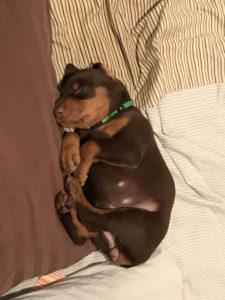Bringing Home A New Puppy

Your puppy will benefit from sleeping close to you for the first few nights. Your puppy will look to you for emotional and physical needs once he or she is removed from its mother and siblings. A hot water bottle and a blanket will provide some physical comfort. Sometimes a radio provides comfort during your absence. And, some say putting a standard wind up alarm clock that ticks into a heavy sock and putting it in your puppy’s bed simulates his mother’s hear beat and will help him to sleep easier.
During the first few nights, you may have to be firm. The puppy must get used to sleeping in its own bed. If it starts crying and howling, don’t cuddle it as this may reinforce and encourage the behavior. Eventually, the puppy will become exhausted and will naturally sleep. If the puppy starts crying in the middle of the night, it may need to be taken out to relieve itself.
Advantages of a Puppy:
A puppy is a blank slate. You can love them, train them properly and enjoy their puppy-hood. They generally don’t have the emotional “baggage” that sometimes accompanies adult dogs. They may adapt and interact with your family and other pets in a more positive way than an adult dog.
Disadvantages of a Puppy:
They need to be housebroken, they chew, dig and can be generally destructive. They will disrupt your lives in a way that an adult dog might not.
TIPS ON HOUSEBREAKING YOUR DOG
Puppies and adult dogs go to the bathroom approximately twenty (20) to thirty (30) minutes after drinking water and consuming food; therefore, follow these steps during the house breaking process:
- Feed them at fixed times of the day: puppies two (2) times a day and adults (over one year old) one (1) time a day.
- Set out food and water for a fifteen (15) to twenty (20) minute period and then pick it up. Don’t give them food or water unless you are prepared to take them out for a walk twenty (20) to thirty (30) minutes later.
- After they make a successful “potty” trip, praise them and tell them what a good dog they are. Try to go back to the same area next time. They will begin to associate the area with the purpose of the trip.
- Always use positive reinforcement of praising and petting them.
- Never punish the dog or puppy after-the-fact, like rubbing their nose in the mess or spanking them. The dog will not understand why it is being punished. Instead, if you catch them in the act of making a mess in the house, say “NO” in a low stern voice and take them immediately outside. DO NOT HIT THEM.
- Dogs are eager to please as they want you to praise and pet them. Positive reinforcement, when they do what you want, is the fastest and best way to house break your dog.
- Many trainers do not advise “paper training” because they still have to house break the animal after it is paper trained. Some trainers advise “crate” training at night. Put the puppy or dog in a crate large enough to stand and turn around in. Dogs are reluctant to make a mess where they sleep; therefore, they are likely to whine when they need to go outside.
